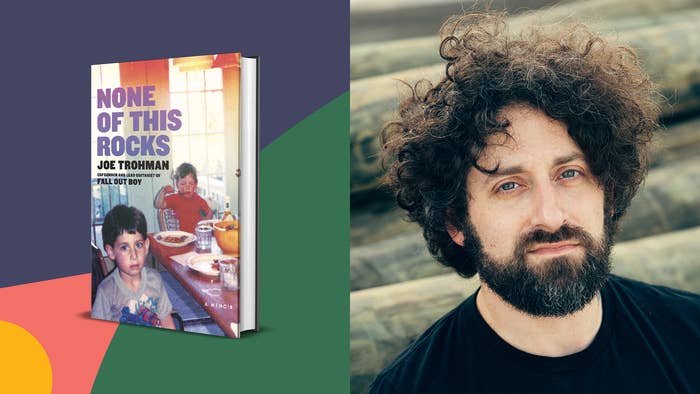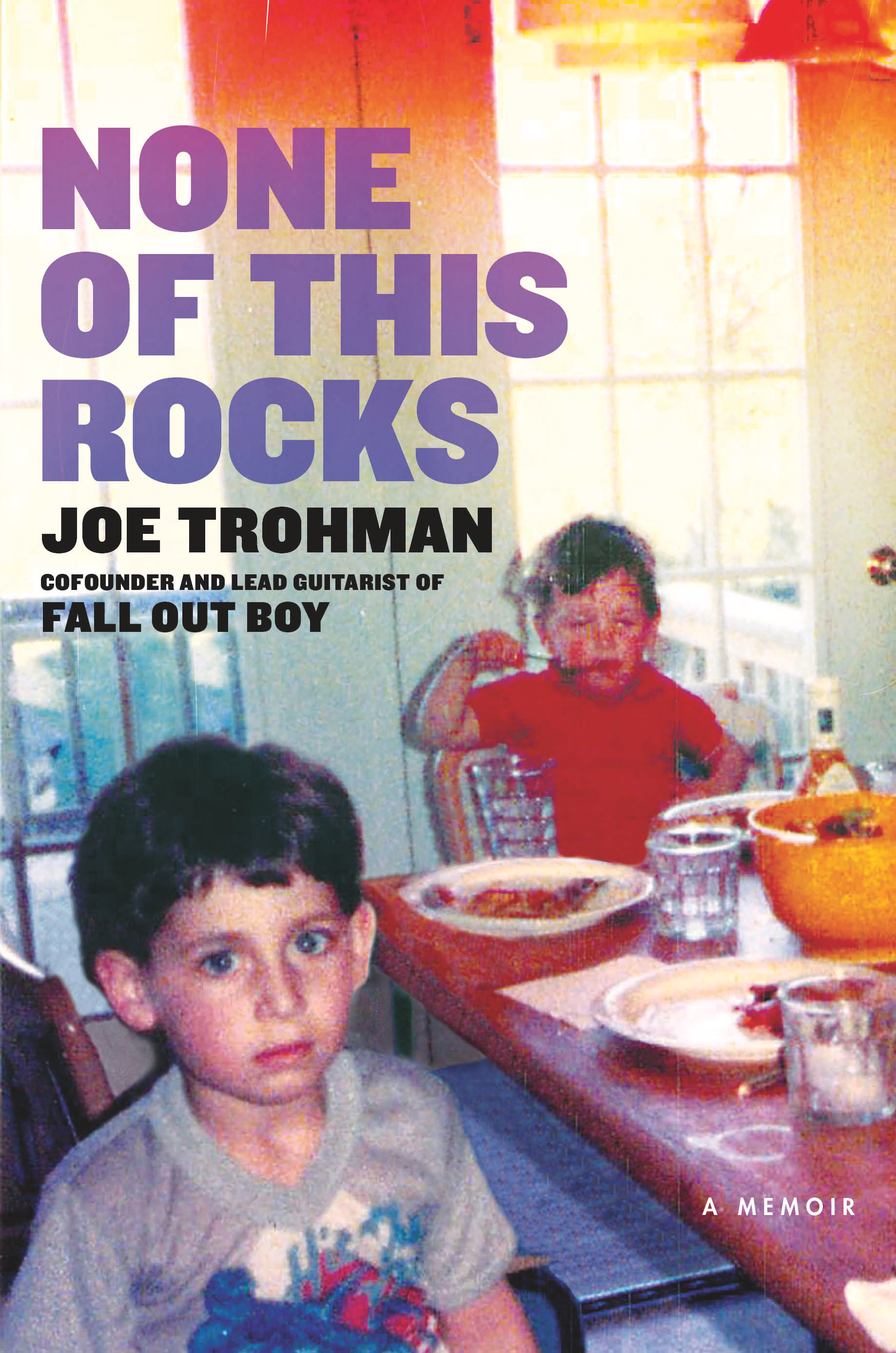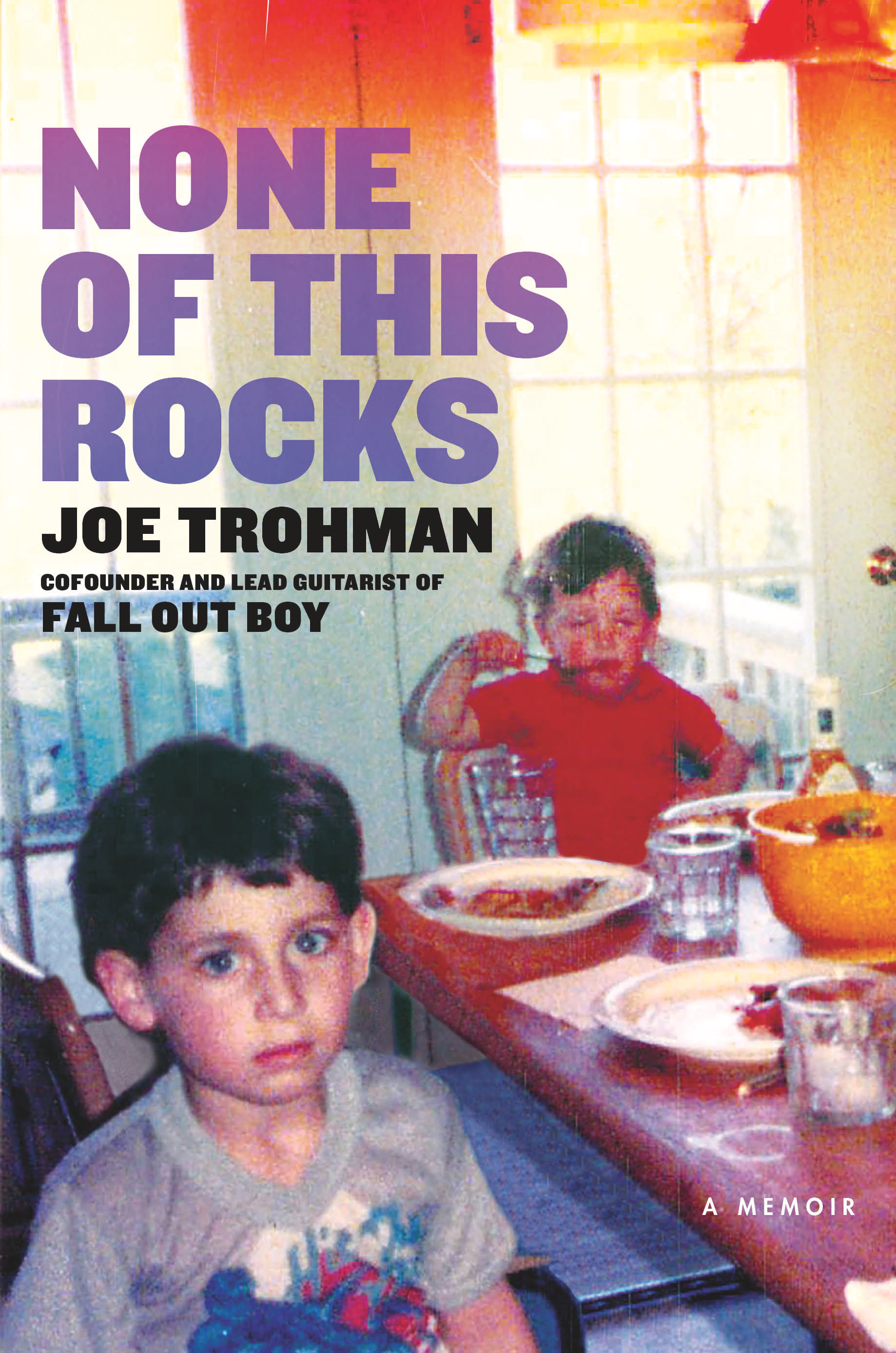
If the name Joe Trohman sounds familiar, that may be because he's the lead guitarist and backing vocalist for the renowned band, Fall Out Boy — but you also may know him from his heavy metal band, the Damned Things. In his most recent creative endeavor, Trohman puts pen to paper in his humorous and heartfelt memoir, None of This Rocks.
With sharp wit and thoughtful examination, Trohman draws from his unique experience as he pulls back the curtain on his personal life. And while he delivers details on the formation and rise of Fall Out Boy, he also gets candid about his own history. Taking us back to his childhood during the late ‘80s and ’90s, Trohman recalls his distant and oftentimes rocky relationship with his mentally ill mother, anti-Semitism from his peers and community, moving around the country, advocating for his own mental health and therapy, and the misogyny and racism he witnessed within the punk scene. None of it's vague or sugar-coated. Instead, Trohman’s candor allows us to authentically glimpse into the highs and lows of his life growing up as a loner kid who loved music.
We had the opportunity to chat with Joe about his memoir — out now wherever books are sold.
Farrah Penn: Hi Joe! This is Farrah with BuzzFeed. Thanks so much for taking the time to chat with me! I'm so excited to get to talk to you about your memoir today. How are you doing?
Joe Trohman: Thanks so much, Farrah. I really appreciate it. Doing alright. Can’t complain. I mean, I always can, but I won’t.
FP: Ha! Sometimes a nice venting session is good for the soul. Let’s go ahead and kick this off. What made you decide to write a memoir? Where were you when you first got the spark of an idea for this book?
JT: Initially I never wanted to write a memoir, whatsoever. I had been approached in the past by other writers to do one, collaboratively, but hated the idea. I don’t find me interesting. Plus, my stupid ego was like, “If you’re going to write a book, then YOU’RE going to write a book.” Cut to years later, my literary manager suggested I write a book about me, to which I responded, “Ew. No way.” Then he responded, “Cool. Didn’t think you could do it anyway.” Then my ego came back in the mix, yelling, in a cookie monster voice, “FUCK YOU! YES I CAN.”
From there I started writing as if I were compiling journal entries. It was surprisingly therapeutic. So I kept on. And now here I am. Book all done. For better or worse.

FP: That’s incredible. Nothing like someone telling you, “You can’t do it!” to make you want to prove them wrong!
The book is fantastic, first of all. I was actually telling a friend about it, how it’s called None of This Rocks, and she said, “Man, that’s a great title!” And it is! Did you come up with it?
JT: Well, thank you very much. Means a great deal!
It is my title. I assumed the publisher would want to change it, but they obviously liked it as well. It all came from the fact that I don’t feel like a “rockstar.” That word both makes me gag. It is better suited for an abhorrent energy drink or to be used by a guy in an Affliction shirt at a topless bar. I’m just a dorky dad with bad tattoos. I definitely do not rock. And the book itself is the antithesis to a rock 'n' roll memoir. It’s not chock-full of stories about snorting meth off an exposed boob on a recording console. It’s mostly about my screwed-up brain, which also doesn’t “rock.”
FP: That was a surprise to me upon reading this, because so many people see you — and the band — in this very specific, successful way due to having such a remarkable career, so it’s assumed that a certain type of “rockstar” lifestyle follows this kind of image. And this book isn’t just about your career with Fall Out Boy, but also your childhood, your complicated relationship with your mother, anti-Semitism you experienced moving from place to place — did anything about writing your story surprise you once you began?
JT: Yeah, the perception about us is different than the reality. Lots of assumptions. We’re pretty low-key guys and don’t actively participate in classic “rockstar” antics.
What surprised me most is how easy it was to tap into these memories and unpack them. I thought my brain was mainly full of reruns of M*A*S*H*, Simpsons quotes, and inane facts about minor Star Wars characters. Apparently, I had a deluge of real things behind my brain dam that I was more ready to explore than I had realized.
FP: Your writing is very honest. It felt like catching up with an old friend. Did you have support from your family throughout the process? You mention consulting Pete [Wentz] at one point in the book — was the band supportive?
JT: That’s incredibly cool of you to say. It was important for me that this book feel relatable.
The family I have left is very supportive — my wife, my dad, even my kids are very active in their excitement regarding the things I do/make.
The band is always behind the things I do outside the group. We all try to back each other up on “extracurriculars,” so to speak. And with this, they trusted the book was not to be some gross exposé on the inner workings of Fall Out Boy. Sure, I talk about the band, it’s part of my life, I’ve been doing it since age 17. But they knew it was going to be a me-centric thing. I even shared an early manuscript with them. Lots of 👍 emojis. High praise these days!
FP: Love to hear that! There were so many ways in which it resonated with me, and I know it’ll also resonate with many others too.
It seems like you’re as close as brothers in the way you write about your relationship with them. You talk about being the “glue guy” — the one who brought everyone together and helped keep the momentum going. Do you feel like you had something special with Andy, Pete, and Patrick in those very early days?
JT: I still think we do, otherwise we wouldn’t be around or even remotely relevant. But it felt clear to me in those early days that Pete, Patrick, and I had something special, even if that something special wasn’t fully tangible at the beginning. Because do not doubt it for a second: we sucked. Awful. Lots of reasons to break up. But still, something was there. I knew it. And once we were able to wrangle Andy into the fold, a REAL drummer, that “special” materialized in the music. And that brought us even closer together.
FP: You don’t shy away from discussing the highs and lows of your career trajectory in a way that’s reflective and self-aware, even going on to mention the album you believed just wasn’t good. You also write honestly about mental health and therapy, which I think is so important to read about and discuss in general. Was this a challenge to write, or was it more therapeutic?
JT: Yeah, I am not good at holding back, haha. I suppose if the worst thing I have to say about my band is that I didn’t enjoy the making and release of one album, then I didn’t really go that hard.
But, regarding the honesty surrounding my depression, my anxiety, my mood disorder — it was both a challenge and therapy. The challenge was finding the words to describe certain ethereal chemically based feelings and experiences that I had yet to verbalize. But once I found those words, the expression worked as a release to a pressure valve. I mentioned approaching this book like journaling, which people always say is good for the ol’ bad brain. And this sort of worked like that. Plus, there’s the notion, the inkling of a thought that maybe, just maybe, sharing what’s happening inside my mind will make others with equally complicated brains feel less alone in the world.
FP: I do truly and whole-heartedly think you accomplish that. At least, those were my feelings after reading. A lot of the time, it is hard to verbalize, and I really appreciated your candor. Also, your sense of humor is so great, and your voice in particular shines. Is there a specific section that was your favorite to write?
JT: Well, thanks! I suppose two decades of being a mental patient has helped me to better find the words for strange, confusing, thoughts. Ain’t therapy grand?
I have two sections I enjoyed writing most: when my mom willingly left me with hundreds of strange Orthodox Jewish men to dance around an Optimus Prime-sized Star of David. And then there was the chapter regarding trying to befriend my anti-Semitic bully, leading to a near arrest for lifting Swisher Sweet cigars. Those are two different, albeit fucked-up, memories that I thought were so stupid. They were easy for me to laugh about. I don’t know why. I suppose because, with the former, my mom was out of her mind. And with the latter, because I was out of my own.
FP: Two very different memories for sure. I can see why both stuck with you! Is there anything you wanted to include in the book that ended up on the cutting room floor?
JT: I went pretty ham on what I had wanted in this book. The closest thing to a “cutting room” floor chapter would be the one about cutting (pun intended) into my back and getting my most recent back surgery, which led to a full-on, Cuckoo’s Nest mental breakdown. I wrote it on my own, didn’t tell my editor. I figured we were done by that point. Then he suggested needing something more, something relating to behind-the-scenes interactions and feelings regarding my relationship to the band. So, I presented him with that chapter and he was thrilled. That almost didn’t make it.
Otherwise, I think I’ve cleared so many stories from my mind. Now I can think about a million other unearthed moments from my past. Maybe I’ll write another sad boy book if people read this one.
FP: You’ve had such a healing journey in so many different ways. It was also intriguing to read about your start before Fall Out Boy and how you came to love the guitar. You mention that the current music landscape seems to have an aversion to guitars, but do you think that’s changing or due to change?
JT: I think it’s changing somewhat. My oldest daughter loves Olivia Rodrigo. Her big hit is super guitar driven. Like it or not, Machine Gun Kelly made a relatively big guitar record. It may not be my thing, but it’s all guitar. That’s exciting. Even hardcore bands like Turnstile are breaking through the noise a little, crossing over somewhat. There still isn’t a big guitar presence on what constitutes for pop radio these days, but maybe that doesn’t matter? Seems like TikTok is the arbiter of pop culture these days. So here’s hoping for more guitar-driven stuff hitting big with the youths on the app I may officially be too old to use and understand.

FP: Toward the end of the book, you discuss achieving a worldwide level of success and how relevance is connected to that. It’s very insightful. I wondered if you had specific advice for other artists — those who are just starting out or those who are still going for it?
JT: I wouldn’t know how to advise new artists in a 2022 landscape. It’s SO different than 22 years ago when we started. It legitimately frightens me. Too much online all the time. Things were not totally internet dependent then. We sold physical records. Nielsen Soundscan mattered. We’re dinosaurs. Old hounds. Put us down, please!
That being said, I never got into the music thing with the intention to succeed. I did it because I loved it. I still do, it’s just very different when it’s a career. But I’d advise not going into it expecting a career. That’s surface level. Everyone will know you have a vapid angle. Make music for the sake of enjoyment. Make what you like. Don’t overthink it. Have fun. And maybe, if it’s really good, people will be drawn to it. Not just because of the quality, but because of your authenticity. Because you’re doing it for the sake of the act, not to fulfill some sort of career ambition.
FP: Wow, yes. I love this advice. You said it perfectly!

To pivot just a bit, can you talk a little bit about the cover?
JT: Ah, the cover. That’s me in the front, clearly over it. I’m often over it to this day. It’s my go-to emotion: apathy. And in the background is my brother, Sam. He’s munching away on something. Boy did he love food. Still does I reckon. It must have been 1991. Somewhere around there.
I didn’t have a lot of photos to choose from for the cover. Believe it or not, my mom threw away all of my childhood photos. Out with the old me, I always say! To be fair to her, she was not in her right mind for most of her life.
This photo, and the other oldies in the book, were luckily found hidden behind some boxes by my step-mother when she and my dad were cleaning out his old condo to sell.
FP: Glad they could uncover this gem for you! It’s great. An overall intriguing cover. 10/10 would pick up.
What do you hope people take away from your story? And what’s next for you and/or Fall Out Boy? (Perhaps a 20-year anniversary tour for Take This To Your Grave?)
JT: Ha! Thank you!
The intent of this book is two fold: to explore my issues and present them in a way that will connect with people who are struggling similarly. If I can make one person feel less alone then it’s done its job. If I can make someone laugh at the absurdity that is my mind, I’ll take that as well.
Not much going on with me. Writing some comics with my buddy, Brian Posehn. We currently have one called The Axe running in Heavy Metal Magazine. It follows some traumatized kids who open a portal into a hellscape using a demonic guitar. Very fun. Very obviously me. We have another one we’re doing for Image. A comedy sci-fi jaunt. Keep an eye out.
Fall Out Boy will be playing Rock in Rio in September. Otherwise, we’re all quiet on the Western Front. Nothing to see here. And unfortunately, no Take This To Your Grave tour. I’m sure we’ll make some nifty T-shirts though! Outside of that, it’s all move along, etcetera and so forth.
FP: Comics, music, a novel — all very exciting stuff!
Joe, it’s been a pleasure getting to chat with you today! I’m so thrilled for others to get to read this book.
Before I let you go, I’d love to end with this question: What are three emojis you’d use to describe None of This Rocks?
JT: Pleasure is all mine, Farrah! I really appreciate the time. So happy to do this. And thanks again for all the kind words regarding the book.
I suppose I’d choose:

Follow Joe Trohman on Instagram and Twitter. You can buy None of This Rocks wherever books are sold.
